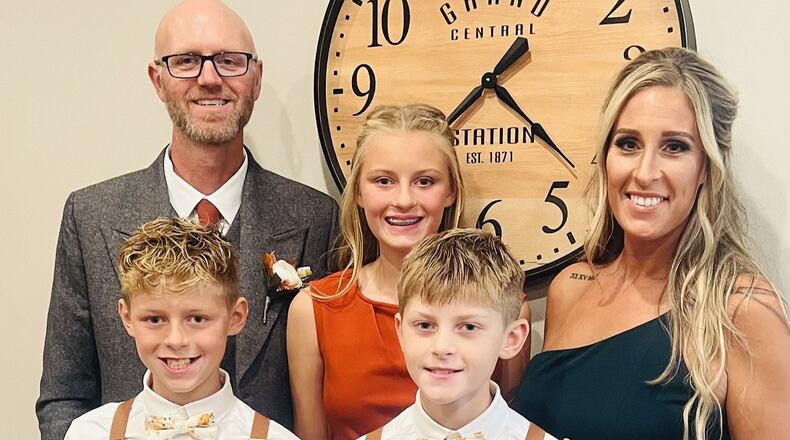“I’ve always been a nurturing person,” Westerfield said. “And I wanted to help people.”
But it wasn’t until Westerfield had a health scare of her own, that she realized how she might help.
Originally from St. Mary’s, Westerfield graduated from high school in 2004. She attended Tiffin University for one year and then transferred to Wright State University.
Westerfield, who had been a three-sport athlete in high school, played basketball and volleyball in college and majored in business administration.
But she also developed an interest in the medical field while at WSU and started her nursing degree. Though she never finished, she did become a State Tested Nursing Assistant (STNA) and began working at Joint Township Hospital. She met Max, who is a Celina native, and they married in 2011.
“The medical field always fascinated me,” Westerfield said.
Once the Westerfields began having children — first Mckenna (now 12), then Jack (now 10) and finally Charlie (9) — she took some time off from working full time.
But a sudden medical scare changed everything.
“I have always struggled with migraines, and they were getting to the point of being debilitating,” Westerfield said. “I knew something was wrong.”
Her doctor scheduled an MRI (magnetic resonance imaging); but the day she was to go, Westerfield started having severe dizzy spells.
“I went to the ER and was diagnosed with hemiplegic migraines,” Westerfield said.
Symptoms of these rare type of migraine headaches can range from weakness to temporary paralysis. Westerfield said half of her body was paralyzed. She was put into a medically induced coma after being transferred to Miami Valley Hospital in Dayton. She remained hospitalized for three weeks.
“I had endless spinal taps and got another diagnosis of meningoencephalitis,” Westerfield said.
Westerfield eventually recovered and gave birth to a healthy son in 2013.
“Max has a cousin that at the time was struggling with infertility,” Westerfield said. “They had one son but had many miscarriages after that. It was heartbreaking.”
Westerfield wanted to help and researched the causes of miscarriages. She noticed how often the word “surrogacy” kept popping up.
“The more I looked into it, the more I thought I could do this for people,” Westerfield said. “I talked to Max, and it was an immediate ‘no!’”
Because of Westerfield’s medical scare and because they had not yet had their third child, her husband was hesitant. After Charlie was born, though, Westerfield tried again to bring up the topic.
“I did more research and really educated myself,” Westerfield said. “I brought it up to Max again, and he finally understood it was becoming a huge passion for me and he agreed.”
Westerfield put herself on an online surrogacy list to be matched with prospective parents. She met a couple from Cleveland who had had two children of their own but could not have anymore.
“In 2015, I was able to give them that third child,” Westerfield said. “A little girl.”
After completing her first surrogacy journey, Westerfield had no doubt she had found her calling. She is a gestational surrogate, meaning that embryos from natural parents are implanted into her body. She is not biologically related to any of the children she carries.
In the summer of 2024, she will give birth to her seventh baby since becoming a surrogate.
Westerfield discovered that there is a shortage of available healthy surrogates, with only about one available for every six couples who want to go that route. Westerfield took her wealth of knowledge and decided to start spreading awareness while helping intended parents and starting a consulting firm. She opened “Carrying Dreams” in August 2023. Her company helps couples and surrogates connect and also helps them find financial aid (surrogacy has an average price tag of $150,000).
“I was introduced to a same-sex couple in Canada, and they own companies within the fertility community,” Westerfield said. “We talked about a mission and vision for this company, and we are now partners.”
Carrying Dreams has an office in Troy, and Westerfield is the CEO and surrogate program director. She also has an egg donation program director on her team. The company offers everything from pre-screening services, financial information and assistance to a unique matching process for intended parents and surrogates.
“This is a big ask and surrogacy isn’t for everyone,” Westerfield said. “I would love for people who have done this to share their stories so we can begin to debunk the myths around surrogacy. You aren’t giving away your own child. You are helping people have their own families.”
For more information, log on to Carrying Dreams Inc. – Where Dreams Meet Possibilities
About the Author



